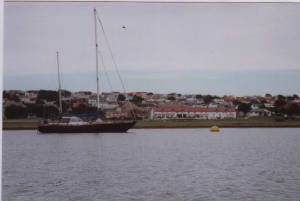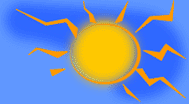|
| Winter in Falkland Islands |

|
| Mithril moored off the Upland Goose Hotel |
We intended being in the Falklands until January '99 but our plans
changed somewhat and we left there in October. With hindsight it was a mistake to spend a winter in Stanley; arriving there
at the end of March we would have been better cruising the islands for a couple of months then and moving on to Cape Town
which has a much better winter climate. It proved too cold in the Falklands for doing maintenance work like painting and facilities
for yachts are minimal. There are no proper alongside berths, we spent 6 months lashed to a mooring and when the weather was
bad we couldn't get ashore; for example we were ashore only 5 times in the whole month of July. On the plus side it was useful
to have good postal facilities and we were able to get free dental treatment, use the library and so on. The islands are also
famous for their wildlife especially birds - in fact 75% of the total global seabird population visit the islands over the
course of each year. Apart from paying for the British garrison of some 2,000 the islands are financially self supporting
but rely heavily on Britain for everything from baked beans to Land Rovers and flat pack timber houses. Ships regularly land
packets from Argos and Kay's catalogues. 99.9 percent of the food comes from Britain from frozen peas to jelly babies. It's
rather bizarre to find Tesco sausage rolls in the freezer 8,000 miles from Britain. They even import (frozen) sliced bread
which by the time it reaches the South Atlantic costs 1.25 a loaf. Even the potatoes and onions come from England. Everything
was about 2.5 times the price of Britain and if it hadn't been for the out of date and reduced shelves we wouldn't have eaten
well at all. Before leaving we bought 2 whole sheep direct from a farmer for 12 each which Peter cut into freezer sized
pieces with a hacksaw!! Stanley itself is a colourful village with lots of history from 18th century shipwrecks and
Great War memorials to the war of 1982 and most recently oil exploration just offshore. There is a typically English church
with an incongruous tin roof and a whale bone arch in the grounds and a hideous 1960s town hall. The people are smug about
their little bit of isolated paradise and while superficially friendly are suspicious of newcomers. Crime is confined to drunken
driving and fighting in the pubs. Justice is normally in the shape of fines and if you are really bad there is a black list.
This is a piece of paper taped up in shops and pubs listing people who are to be refused drink. It's also an offence to buy
drink on their behalf. Obviously this only works because everyone knows everyone else's business. As far as climate goes it's
very windy but doesn't rain much and is often bright and sunny. Winter is calmer than summer with some snow every year but
not for long. Land is cheap; 50 acres 10 minutes from town and with planning permission is 3,000 but on this you
can support about 10 sheep! There are plenty of jobs, all very well paid and no-one to fill them. The British forces provide
radio and t.v. There is also satellite from Chile and local FM which plays a lot of Philomena Begley and Daniel O'Donnell!
In September with the days getting longer we left Stanley on an early spring cruise round East Falkland. We had
some spectacular weather both good and bad. The bad kept us at sea overnight a couple of times as we couldn't make headway
westwards towards an anchorage and had to remain offshore until the usual dawn calm allowed us to make a new landfall. The
good had us ashore in t. shirts and broad brimmed hats to protect against the hole in the ozone layer that visits the Falklands
each spring. We had 3 days of summer at one time which will live in the memory as the days we walked among the penguins on
Speedwell island with almost tame little tussac birds hopping alongside chirping happily. Only yards off the fine white sand
beach there were killer whales and dolphins patrolling in the kelp, while oyster catchers grew agitated trying to keep us
from their nests in the dunes. There were also king penguins, almost 3ft. tall, with their chicks - enormous fluffy brown
teddy bears with continually open mouths squealing for hard pressed parents to regurgitate fish. In the distant blue haze
were the pointy hills of West Falkland which is in complete contrast to the bare, low heathland of the east island. For our
picnic we sat overlooking a small inlet of very clear water watching a sealion lolloping about when a striated cara cara,
a small eagle type bird, came and sat right beside us. It looked eagerly from bright beady eyes and demanded a share in our
sandwiches. If it had been someone's pet budgie it couldn't have been more friendly and yet this is a bird on the endangered
species list - perhaps its friendly habits have worked against it in the past. It followed us round the beach for a while
like a stray dog and eventually flew off on other business. This was also the beginning of lambing and we often came upon
hours old lambs learning to stand and run before the same friendly cara cara could attack it. The sheep are left entirely
to themselves and if they live or die lambing is their own lonely fate. It's only months later at shearing time that the farmers
first see the new season's lambs. Unfortunately these were days out of time and it was more normal to be sitting below with
a turf fire blazing listening to the Archers while the wind whistled in the rigging. Nearly all the land is burnable turf
and we just cut our own from banks by the shore. In Stanley, population 1,800, we met very few people as we weren't ashore
often enough and didn't go to any of the 8 pubs. Drinking seems to be the only source of entertainment. In the countryside
however everyone was much more friendly - drinking was still the main social activity. We visited a farm at 11.00 one morning
and as usual were invited in but instead of tea we were offered rum. Being still early spring there wasn't much work to do
and the household already had their glasses charged up and sat, like characters from a Chechov play, looking out the window
at the snow squalls passing over Mount Kent and moaning that they worked for the bank not themselves on this godforsaken farm.
We didn't stay long!! At Goose Green which you may remember from the war of 1982 we were befriended by a shepherd and his
wife who worked for the only remaining big absentee landlord. Wages are very poor but they have a free house, electricity
and turf. Every week they get half a sheep and in winter a quarter of a cow every fortnight. The meat hangs from a gibbet
in the garden. Inside the house the walls were decorated with framed pictures of grand children and country and western singers
including a large portrait of our own Daniel. Everyone has a story to tell of the Argentine invasion - mostly amusing anecdotes.
My favourite concerned the Gurkhas who are held in great affection by the islanders and are always made much of during their
4 month tour of duty. A rumour reached the Argies that the QE2 was bringing Gurkhas to join the fray. Their reputation, especially
stories of what they liked to do with their big knives, preceded them and an Argentine officer came to ask our narrator how
many Gurkhas could you fit on the QE2. He replied that seeing as they were such little fellas probably about 15,000 and the
officer slunk away ashen faced. Reminders of the war abound; from bits of guns and crashed helicopters to minefields fenced
and marked with skull and crossbones. As it is expensive in men and time to clear mines any not directly in the way of citizens
were left and fenced off. This is no great inconvenience and actually benefits the wild life especially birds whose nests
and eggs now remain untouched. Just outside Stanley penguin numbers have increased enormously since they don't set off the
mines and therefore have the beaches to themselves and locals can no longer collect their eggs. It is also a good tourist
draw; cruise ships land visitors, mostly American, who crowd the fence to stare at the bemused birds.
In the great
days of sail the Falklands were on the major route close to the Horn and all around the islands are dozens of wrecks which
survive excellently (for firewood!!) due to the coldness of the air and the lack of critters to eat the hulls. We temporarily
joined their number when we went aground at Goose Green for 36hrs. After a sudden wind shift at 02.00 AM the anchor didn't
retake and we were high and dry before we could do much. Fortunately it was 3 days before spring tides and by a combination
of kedge anchors, re-trimming interior ballast and sailing at high tide we managed to get off with no damage done. We were
like little old men though, stiff and bent from winching kedge lines for hours in the cold and snow. Towards the end of our
spring cruise we called into Port San Carlos from where, in 1982, the British forces made their beach-head. This was the most
delightful settlement we visited. The house was situated at the head of a bay on a bend in a long river about 4 miles inland
from the sea itself. There was high land all around and the house basked in sunny calm for much of the time while the clouds
scudded by overhead giving some idea of conditions outside. Best of all it had a jetty and we tied up here for 10 days while
we made our preparations for the voyage to South Africa. The family were related to the rum drinkers I mentioned earlier but
these were a much soberer lot and didn't seem to be so beholden to the bank. They also seemed to do some work about the place
and even had a self catering cottage for rent, mostly to off duty soldiers for assignations of the Mr and Mrs Smith variety.
In the creek lived a pair of very small black and white Commerson's dolphins. When we went up the river in the dinghy they
followed very closely and often my glasses were misted up with spray from their blow hole. It isn't given to many to get that
close to dolphins in the wild. Presumably it's because the islands have a total population of only 2,300 in an area the size
of Wales that the wildlife is so tame. The only thing we didn't see were elephant seals but maybe next time round we'll be
luckier. We had intended going to South Georgia on our way to South Africa but even though it is British we were to be charged
50 each for landing and 50 for the boat as if we were cruise ship passengers. We wrote complaining to the governor but
he was adamant so we decided to give it a miss and went straight to South Africa.
Return to Archive Menu
|


